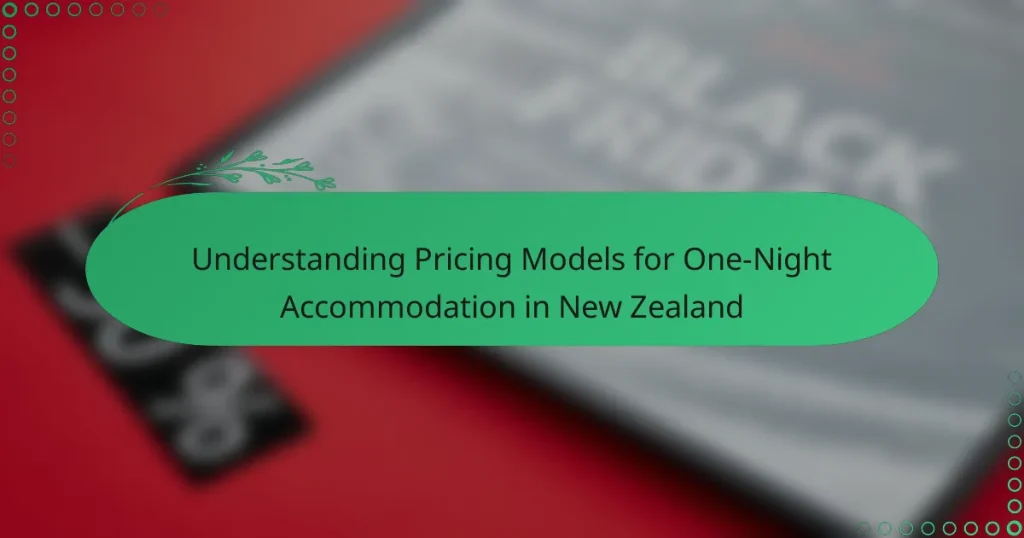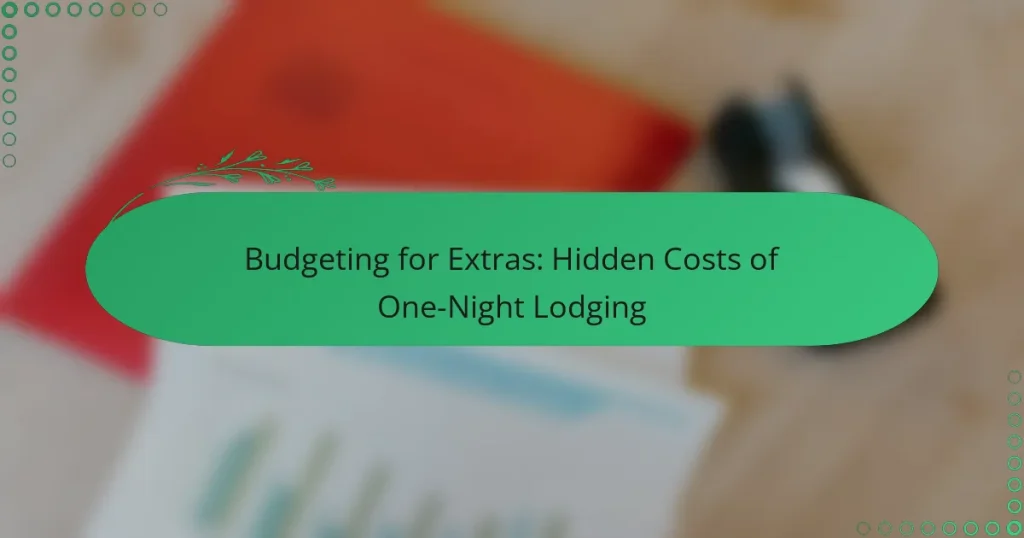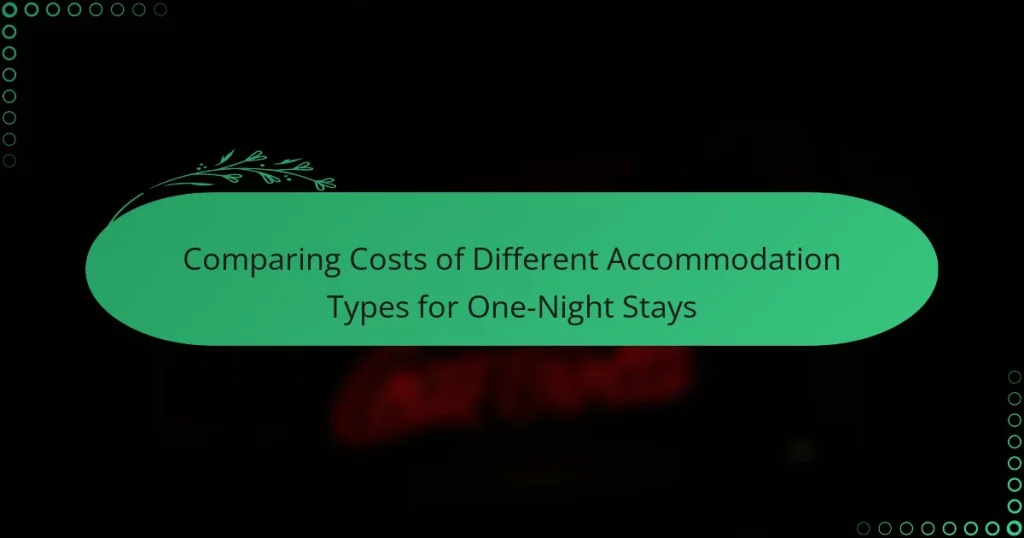When planning a one-night stay in New Zealand, several cost factors come into play that can significantly impact your budget. Key elements include the type of accommodation, its location, seasonal pricing variations, available amenities, and any fees associated with booking platforms. By understanding these factors, travelers can make more informed choices and optimize their travel expenses.
Understanding the Impact of Local Events on One-Night Stay Prices
How to Find Discounts and Promotions for One-Night Stays
Understanding Pricing Models for One-Night Accommodation in New Zealand
Budgeting for Extras: Hidden Costs of One-Night Lodging
Comparing Costs of Different Accommodation Types for One-Night Stays
How Seasonal Demand Affects One-Night Stay Prices
What are the main cost factors for one-night stays in New Zealand?
The main cost factors for one-night stays in New Zealand include accommodation type, location, seasonality, amenities offered, and booking platform fees. Understanding these elements can help travelers make informed decisions and manage their budgets effectively.
Accommodation type
The type of accommodation significantly influences the cost of a one-night stay. Options range from budget hostels and motels to luxury hotels and boutique lodgings. For instance, a hostel may charge around NZD 30-60 per night, while a luxury hotel could cost several hundred NZD.
Travelers should consider their preferences and needs when selecting accommodation. A more affordable option may save money, but it could lack comfort or privacy, which might be important for some guests.
Location
Location plays a crucial role in determining accommodation prices. Stays in popular tourist destinations like Queenstown or Auckland tend to be pricier compared to rural areas or smaller towns. For example, a central hotel in Auckland may charge NZD 150-300 per night, while a similar property in a less touristy area might only cost NZD 80-150.
When booking, consider the trade-off between cost and convenience. Staying further from attractions may lower costs but could increase transportation expenses and time.
Seasonality
Seasonality affects accommodation prices, with peak tourist seasons typically resulting in higher rates. In New Zealand, summer months (December to February) and major holidays often see increased prices, while winter months may offer discounts. For example, a hotel room that costs NZD 200 in January might drop to NZD 120 in July.
Travelers can save money by planning their trips during the off-peak season. However, they should also consider the weather and activities available during those times.
Amenities offered
Amenities can vary widely between accommodations and impact overall costs. Properties offering complimentary breakfast, Wi-Fi, or parking may charge more than those that do not. For instance, a hotel with a pool and fitness center may have higher rates compared to a basic motel.
When evaluating options, consider which amenities are essential for your stay. Prioritizing must-have features can help you find the best value for your budget.
Booking platform fees
Booking platform fees can add to the overall cost of a one-night stay. Many online travel agencies charge service fees that can range from a few NZD to a significant percentage of the booking price. It’s important to compare prices across different platforms to find the best deal.
Travelers should also check for any hidden fees during the booking process. Reading the fine print can help avoid unexpected charges and ensure a clearer understanding of the total cost.
How does accommodation type affect pricing?
The type of accommodation significantly influences the cost of one-night stays. Generally, hotels tend to be pricier than motels, while hostels are often more affordable than private rentals, impacting your overall travel budget.
Hotels vs. motels
Hotels typically offer more amenities and services, such as room service, fitness centers, and concierge services, which can drive up prices. In contrast, motels usually provide basic accommodations with fewer facilities, making them a budget-friendly option for travelers.
For example, a standard hotel room in a city center might cost between $150 and $300 per night, while a motel room could range from $70 to $120. When choosing between the two, consider the value of amenities versus your budget.
Hostels vs. private rentals
Hostels are often the most economical choice for solo travelers or those seeking social experiences, with prices ranging from $20 to $50 per night for a dormitory bed. Private rentals, such as Airbnb, can vary widely in cost, typically starting around $60 and going up depending on location and amenities.
When deciding between hostels and private rentals, think about your priorities. If you value privacy and a home-like environment, a private rental may be worth the extra cost. However, if you are looking to meet other travelers and save money, a hostel could be the better option.
What role does location play in one-night stay costs?
Location significantly influences the cost of one-night stays, as prices vary based on urban or rural settings, as well as proximity to popular attractions. Generally, accommodations in cities tend to be pricier due to higher demand and operational costs.
Urban vs. rural pricing
Urban areas typically feature higher one-night stay costs compared to rural locations. This is due to factors such as increased demand, higher property values, and a greater concentration of amenities and services.
For example, a one-night stay in a major city like New York or London can range from $150 to several hundred dollars, while rural options might start as low as $50 to $100. Travelers should consider their budget and the type of experience they seek when choosing between urban and rural accommodations.
Proximity to attractions
The closer a hotel or rental is to popular attractions, the more expensive it is likely to be. This is especially true in tourist-heavy areas where convenience is a priority for visitors.
For instance, staying near iconic sites such as the Eiffel Tower in Paris or Times Square in New York can lead to higher nightly rates, often exceeding $200. In contrast, accommodations slightly further away may offer more competitive pricing, allowing travelers to save money while still enjoying easy access to attractions.
How does seasonality influence one-night stay prices?
Seasonality significantly impacts one-night stay prices, with rates often fluctuating based on demand during different times of the year. Travelers can expect higher prices during peak seasons and holidays, while off-peak times may offer more affordable options.
Peak travel seasons
Peak travel seasons typically coincide with school holidays, summer vacations, and major events. During these times, hotel prices can increase by 20-50% or more compared to off-peak rates. For instance, a hotel that charges $100 per night in the winter may cost $150 or more during the summer months.
Travelers should book accommodations well in advance during peak seasons to secure better rates and availability. Last-minute bookings may lead to inflated prices or limited options.
Holiday pricing trends
Holiday periods often see a surge in demand for one-night stays, particularly around major holidays like Christmas and New Year’s. Hotels may implement holiday pricing strategies, resulting in rates that are 30-70% higher than usual. For example, a hotel room that costs $120 on a regular weekend could jump to $200 or more during the holiday season.
To navigate holiday pricing trends, consider traveling just before or after the holiday itself, when prices may drop significantly. Additionally, checking for special promotions or packages can help mitigate costs during these high-demand periods.
What amenities impact the cost of one-night stays?
The cost of one-night stays can be significantly influenced by various amenities offered by the accommodation. Key factors include free Wi-Fi, breakfast inclusion, and parking availability, each affecting both the price and overall value of the stay.
Free Wi-Fi
Free Wi-Fi is a common amenity that can sway the cost of a one-night stay. Many travelers expect this service, and accommodations that provide it may charge a premium, especially in urban areas or business districts. Hotels without free Wi-Fi might offer lower rates but could lose potential guests who prioritize connectivity.
When comparing options, consider the quality of the Wi-Fi as well. Some places may advertise free Wi-Fi but have slow speeds or limited access, which can impact your stay. Always check reviews to gauge the reliability of the service.
Breakfast inclusion
Breakfast inclusion can significantly affect the price of a one-night stay. Hotels that offer complimentary breakfast often justify higher rates, as this amenity adds convenience and value for guests. In contrast, accommodations without breakfast may have lower rates but could lead to additional costs for meals elsewhere.
When evaluating options, consider the type of breakfast provided. Continental breakfasts may be less substantial than full-service options, which can influence your overall experience and budget for the trip.
Parking availability
Parking availability is another critical factor impacting the cost of one-night stays, especially in cities where parking is limited. Hotels that offer free parking may charge higher room rates, while those without parking facilities often have lower prices but can lead to unexpected expenses for guests needing to find alternative parking solutions.
When booking, check if the hotel charges for parking and if there are nearby public parking options. Understanding these costs upfront can help you avoid surprises and better plan your travel budget.
What are the hidden fees associated with one-night stays?
Hidden fees can significantly increase the total cost of one-night stays. Common charges include cleaning fees and service charges, which may not be included in the initial booking price.
Cleaning fees
Cleaning fees are often added to the total cost of a one-night stay, covering the expenses for preparing the accommodation for guests. These fees can range from a modest amount to more substantial charges, depending on the property size and location.
When booking, always check the listing details for any mention of cleaning fees. Some properties may have a flat rate, while others might charge based on the number of guests or the length of stay.
Service charges
Service charges are additional fees that may be applied to cover administrative costs or amenities provided during the stay. These charges can vary widely, often ranging from a few dollars to a percentage of the total booking cost.
It’s essential to review the booking terms to understand any service charges that may apply. Some platforms clearly outline these fees, while others may include them in the final price, making it crucial to read the fine print before confirming your reservation.






